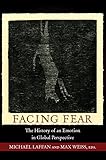Facing Fear : The History of an Emotion in Global Perspective / Max Weiss, Michael Laffan.
Material type: TextSeries: Publications in Partnership with the Shelby Cullom Davis Center at Princeton University ; 4Publisher: Princeton, NJ : Princeton University Press, [2012]Copyright date: ©2013Edition: Course BookDescription: 1 online resource : 11 halftonesContent type:
TextSeries: Publications in Partnership with the Shelby Cullom Davis Center at Princeton University ; 4Publisher: Princeton, NJ : Princeton University Press, [2012]Copyright date: ©2013Edition: Course BookDescription: 1 online resource : 11 halftonesContent type: - 9780691153599
- 9781400845248
- 152.4609 23
- D210 .F23 2017
- online - DeGruyter
- Issued also in print.
| Item type | Current library | Call number | URL | Status | Notes | Barcode | |
|---|---|---|---|---|---|---|---|
 eBook
eBook
|
Biblioteca "Angelicum" Pont. Univ. S.Tommaso d'Aquino Nuvola online | online - DeGruyter (Browse shelf(Opens below)) | Online access | Not for loan (Accesso limitato) | Accesso per gli utenti autorizzati / Access for authorized users | (dgr)9781400845248 |
Browsing Biblioteca "Angelicum" Pont. Univ. S.Tommaso d'Aquino shelves, Shelving location: Nuvola online Close shelf browser (Hides shelf browser)
Frontmatter -- Contents -- Preface -- Introduction: Fear and Its Opposites in the History of Emotions / Weiss, Max -- Chapter 1. Fear of the Thirty Years War / Lederer, David -- Chapter 2. Conceptions of Terror in the European Enlightenment / Schechter, Ronald -- Chapter 3. "When Fear Rather than Reason Dominates" / Walker, Charles -- Chapter 4. Fear in Colonial California and within the Borderlands / Haas, Lisbeth -- Chapter 5. Weimar Cinema between Hypnosis and Enlightenment / Killen, Andreas -- Chapter 6. Italian Fascism's Wartime Enemy and the Politics of Fear -- Chapter 7. The Persecuted Body / McAlister, Melani -- Chapter 8. Danger, Media, and the Urban Experience in Delhi / Sundaram, Ravi -- Chapter 9. Fear of the Past / Etkind, Alexander -- Chapter 10. White Hajjis / Laffan, Michael -- Notes -- Contributors -- Index
restricted access online access with authorization star
http://purl.org/coar/access_right/c_16ec
Fear is ubiquitous but slippery. It has been defined as a purely biological reality, derided as an excuse for cowardice, attacked as a force for social control, and even denigrated as an unnatural condition that has no place in the disenchanted world of enlightened modernity. In these times of institutionalized insecurity and global terror, Facing Fear sheds light on the meaning, diversity, and dynamism of fear in multiple world-historical contexts, and demonstrates how fear universally binds us to particular presents but also to a broad spectrum of memories, stories, and states in the past. From the eighteenth-century Peruvian highlands and the California borderlands to the urban cityscapes of contemporary Russia and India, this book collectively explores the wide range of causes, experiences, and explanations of this protean emotion. The volume contributes to the thriving literature on the history of emotions and destabilizes narratives that have often understood fear in very specific linguistic, cultural, and geographical settings. Rather, by using a comparative, multidisciplinary framework, the book situates fear in more global terms, breaks new ground in the historical and cultural analysis of emotions, and sets out a new agenda for further research. In addition to the editors, the contributors are Alexander Etkind, Lisbeth Haas, Andreas Killen, David Lederer, Melani McAlister, Ronald Schechter, Marla Stone, Ravi Sundaram, and Charles Walker.
Issued also in print.
Mode of access: Internet via World Wide Web.
In English.
Description based on online resource; title from PDF title page (publisher's Web site, viewed 08. Jul 2019)









